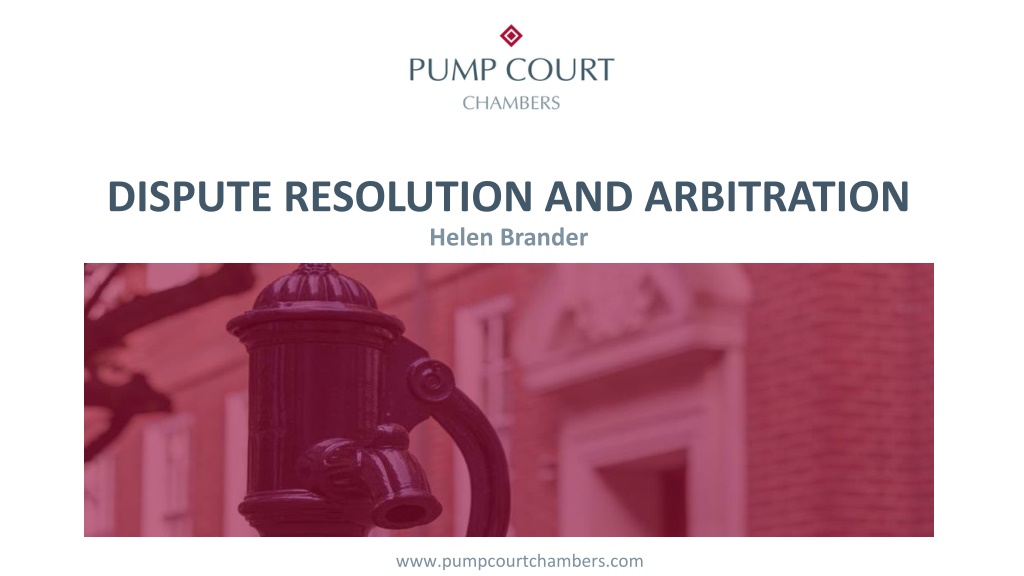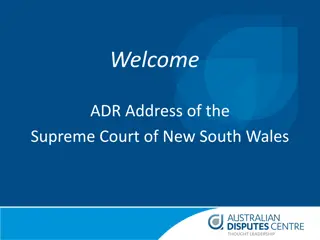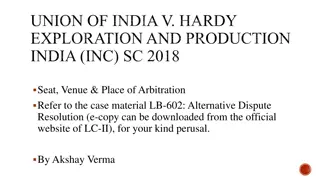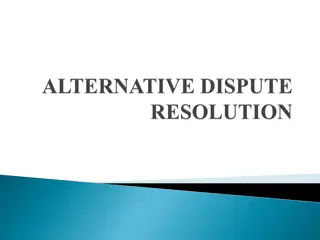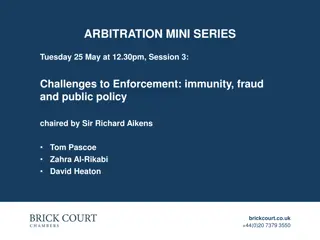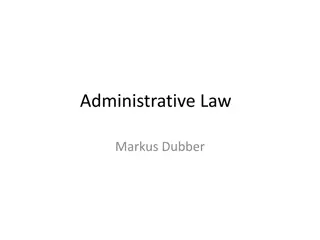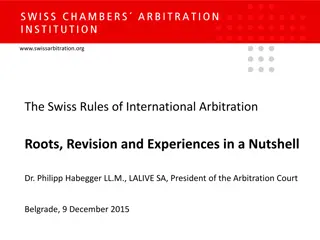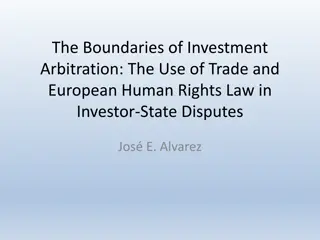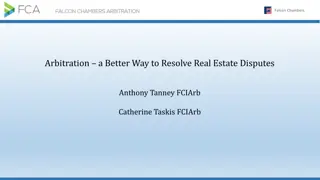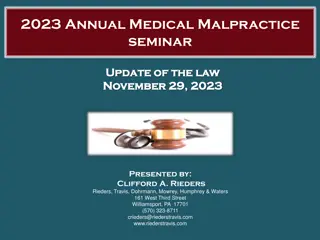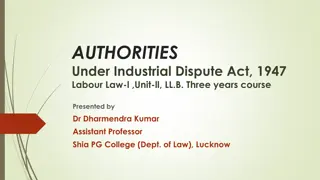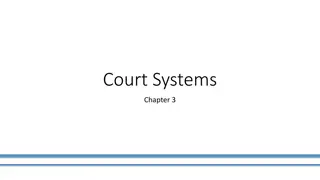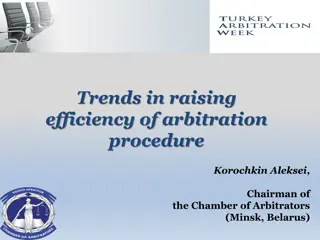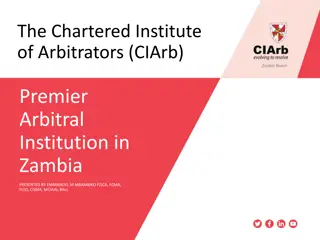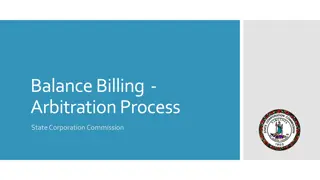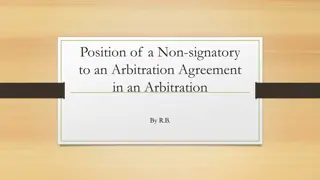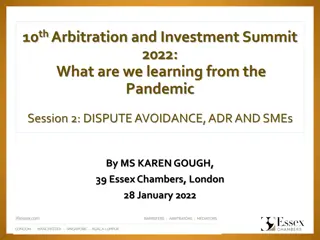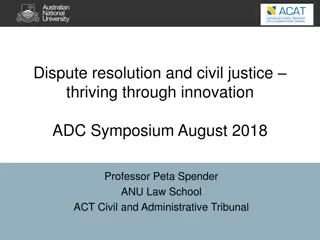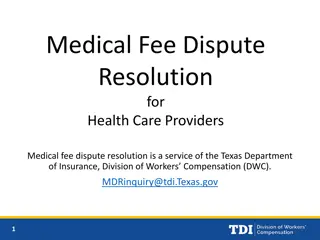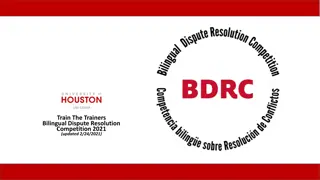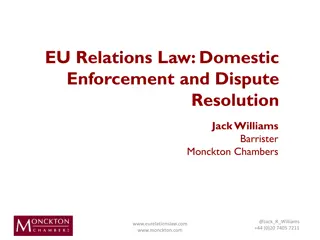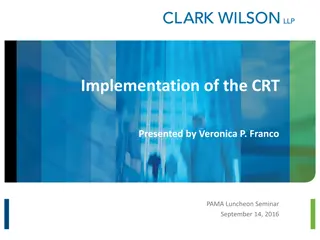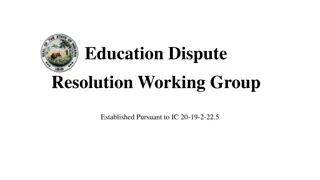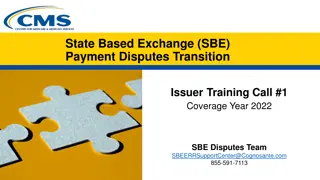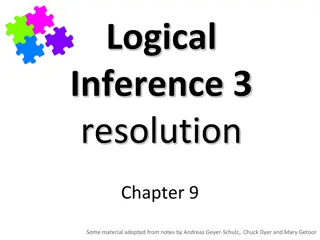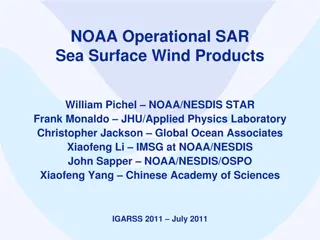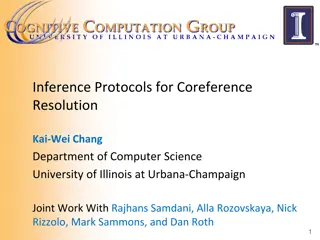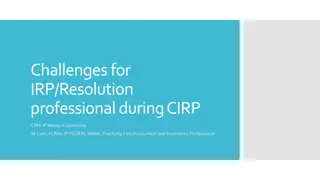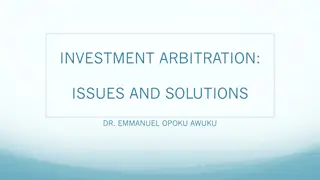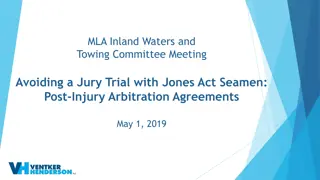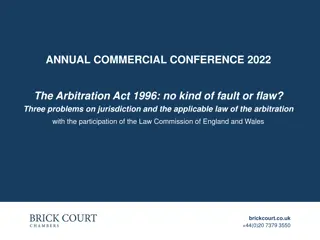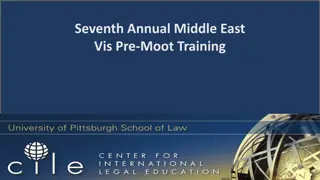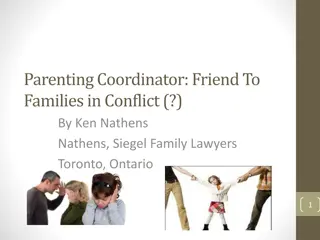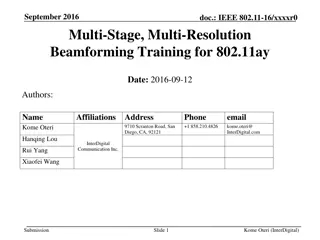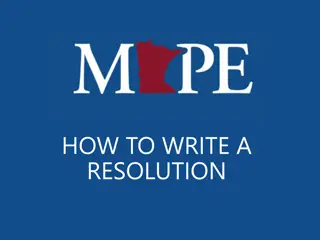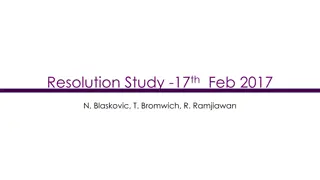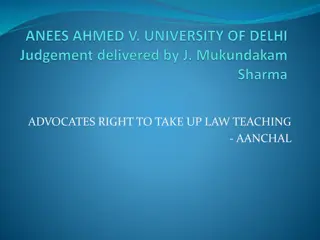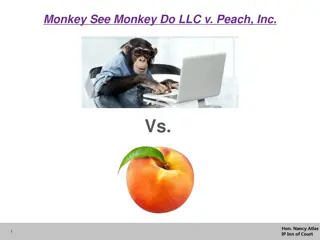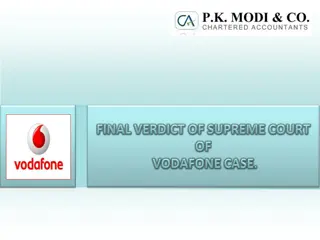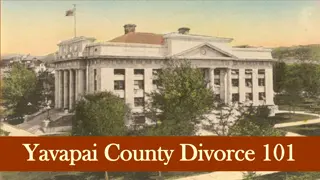Comprehensive Overview of Dispute Resolution and Arbitration Methods
Helen Brander from Pump Court Chambers discusses the various methods of dispute resolution and arbitration including mediation, early neutral evaluation, chancery, and FDR. The content provides insights into how mediation works, the types of mediation techniques, early neutral evaluation process, and Chancery financial dispute resolution. It also covers the significance of involving relevant decision-makers in Ch.FDR sessions and the procedures involved in each method.
Uploaded on Sep 24, 2024 | 0 Views
Download Presentation

Please find below an Image/Link to download the presentation.
The content on the website is provided AS IS for your information and personal use only. It may not be sold, licensed, or shared on other websites without obtaining consent from the author. Download presentation by click this link. If you encounter any issues during the download, it is possible that the publisher has removed the file from their server.
E N D
Presentation Transcript
DISPUTE RESOLUTION AND ARBITRATION Helen Brander www.pumpcourtchambers.com
Mediation Early Neutral Evaluation Chancery FDR Arbitration Court DISPUTE RESOLUTION
Depends on the personalities of the parties and of the mediator. Who makes the recommendation? Mediator guides, but doesn t give indications as to merits. Mediator can stress-test positions. Mediator cannot indicate a structure of an agreement / order. MEDIATION
Couple in a room together with mediator no lawyers. Shuttle mediation suitable where suggestions of domestic abuse / potential for one party to overwhelm the other. Civil-style integrated / hybrid mediation shuttle with lawyers. Child-inclusive mediation: where child is over 10 and all consent voice of child heard directly. TYPES OF MEDIATION
June 2023 updated of Chancery Guide 2022 chapter 10. ENE independent evaluation of the merits of a dispute / issue by a judge or someone with expertise. Time-limited consideration of core materials and reading / listening to concise submissions. Court can order an ENE at a CMC is it deems it appropriate, even where one party does not consent Lomax v Lomax [2019] EWCA Civ 1467 EARLY NEUTRAL EVALUATION 1
Complex factual / legal disputes are generally unsuited. Effective where the claim turns on an issue of interpretation / law / merits of an appeal. Can be carried out by 3rd parties or the court pursuant to CPR rule 3.1(2)(m). Judge gives directions as to how it will be conducted. Draft ENE order at Appendix K Chancery Guide. EARLY NEUTRAL EVALUATION 2
WP, non-binding. Court facilitates negotiations after giving parties an opinion on the claim / elements of it. Parameters of dispute need to be crystallised. Usually need statements. But can apply for one after AOS filed. Consent order can be sought by way of N244 and order in form at Appendix L Chancery Guide. Chancery Financial Dispute Resolution (Ch FDR) 1
All relevant decision makers to be present at Ch FDR. Where non-parties are to attend, inform the Court and seek permission by letter filed on CE-file. Particularly effective in re disputes re shares in property, business partnerships, TLATA, probate, inheritance. Chancery Financial Dispute Resolution (Ch FDR) 2
Available in family work since 22.02.2012 for financial work / TLATA and since 2016 for children work. Suitable where parties cannot agree / are not likely to agree and they need someone else to make a decision for them. Governed by Arbitration Act 1996 and their own sets of rules. ARBITRATION 1
IFLA not for profit organisation created by CIArb, Resolution and FLBA, together with Centre for Child and Family Law Reform. Can have other arbitrations, but will not be IFLA and arbitrators will not be accredited by them. Governing Law for IFLA arbitrations is England and Wales parties cannot choose another jurisdiction. Otherwise, parties can agree terms and scope of arbitration, and identity of arbitrator. ARBITRATION 2
Parties agree to arbitrate they cannot yet be obliged by a Court. Parties, in effect, enter into a contract to arbitrate. Parties agree that the arbitrator s decision will be binding on them. Parties agree the scope of the arbitration. Parties choose the procedure together with the arbitrator by paper determination, hearings or a combination. ARBITRATION 3
The Arbitration Act 1996 provides for only very limited rights of appeal from an arbitrator s decision. S.67 where an award / determination is made without jurisdiction; S.68 serious irregularity which has caused or will cause substantial injustice; S.69 appeals on point of law. Apellant requires leave and has to show that the arbitrator s decision was obviously wrong on the law or if of general public importance, then open to serious doubt. Parties can agree to contract out of s.69 only. N.B. No appeal if the arbitrator is wrong on an evaluative judgment. Challenges to be brought within 28 days of the award / determination. ARBITRATION 4
Guidance on IFLA scheme and how to give approval to consent orders after arbitration or otherwise to have terms of the order / determination scrutinised. Entering into arbitration is a magnetic factor / lodestone pointing the path to court approval of the award para 18, citing Sir Peter Singer binding themselves to accept an arbitral award is a magnetic factor of determinative importance. Judge in making a consent order is not to play detective unless something is seriously wrong so as to fundamentally vitiate the award. S v S [2014] EWHC 7 (Fam) per Munby LJ
Where a party seeks to resile from the arbitral award, the other party s remedy is to apply to the court using the notice to show cause procedure para 25. Focus at such a hearing is whether the party seeking to resile is able to make good one of the limited grounds of challenge or appeal permitted by the Arbitration Act 1996. If they cannot, then the Court will make the order and may provide for its enforcement. S v S [2014] EWHC 7 (Fam) per Munby LJ
Agree to arbitrate. Choose your arbitrator, or invite IFLA to choose one from a list, or invite IFLA to appoint (they will do so randomly). Read the rules found on the iFLA website. Complete ARB1FS. Signing bindss into arbitration. Do this with agreement of arbitrator after initial meeting. Send off to proposed arbitrator and to IFLA. IFLA invites arbitrator to accept arbitration. Once arbitrator accepts, arbitration has begun. How to arbitrate?
Financial and property issues. TLATA decision will be binding as is civil. Is also in private. Schedule 1 claims. Cannot be used to determine proceedings in re insolvency, issues concerning the status of the parties relationship, disputes concerning parenting or care of children. Excellent for chattels disputes on the papers? Variation of maintenance keeps costs to a minimum. Cannot determine jurisdiction. 3rd party disclosure orders cannot be made, nor interim injunctions. What can be arbitrated? Finances
People invest in the process. Considered decision to go into it. They want to be bound. Cost-effective Once you are used to the process, it is swift to set up. Reduces emotional stress of court proceedings. Parties retain a lot of control over process and progress. Encourages amity and cooperation. WHY ARBITRATE?
THANK YOU THANK YOU Helen Brander 25 September 2023
